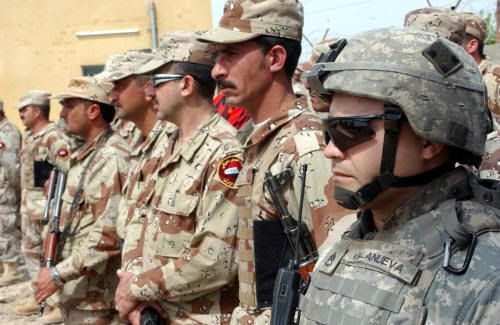The Most Ridiculous Story Of The Year? (2)
 Standards are high for C-SM's Most Ridiculous Story of the Year contest, so two months have gone by since I posted the first entry, Naomi Wolf's "Fascist America in 10 easy steps."
Standards are high for C-SM's Most Ridiculous Story of the Year contest, so two months have gone by since I posted the first entry, Naomi Wolf's "Fascist America in 10 easy steps."The criteria aren't easy to meet: Entries must be work that serious writers present in all seriousness that goes far, far beyond the sublime and settle heavily into the imbecilic.
These criteria were met by Steven Simon and Ray Takeyh in their column "We've Lost. Here's How To Handle It." in WaPo last Sunday, an article that from the statement of the proposition on is illogical, high-sounding and truly dangerous blather.
Last week's bloodshed in Iraq and the bombing of what remained of the historic Shiite shrine in Samarra and of two Sunni mosques in Basra were more reminders of a terrible truth: The war in Iraq is lost. The only question that remains -- for our gallant troops and our blinkered policymakers -- is how to manage the inevitable. What the United States needs now is a guide to how to lose -- how to start thinking about minimizing the damage done to American interests, saving lives and ultimately wresting some good from this fiasco.In wars, bombings come and bombings go. By themselves, they tell nothing of the outcome of the war. Indeed, the Iraqis seem to have hardened to the idea of bombing mosques; the sensational effect terrorists hope for is no longer as sensational. The feeling is replaced with a seething anger towards the perpetrators, a point to remember as we move on.
As for the "terrible truth"' that the war is lost, I'll leave it to Paul Mirengoff of Power Line (to whom a hat-tip is due) for setting that straight:
We haven't lost in Iraq unless our enemies have won, which manifestly they have not done.But for the sake of amusement, let's let Simon and Takeyh lay out their reasons they see defeat.
Iraq has no credible central government that U.S. forces can assist and no national army for them to fight alongside. U.S. troops can't beat the insurgency on their own; our forces are too few and too isolated to compete with the insurgents for the public's support. Meanwhile, the country's militias have become a law unto themselves, and ethnic cleansing gallops forward.I'm not a Pollyanna about Iraq, but this is balderdash, starting with their definition of "credible." Look around the region -- Iran, Saudi Arabia, Syria, Somalia -- is there a government they want to nominate as more credible? It's hard to tell, because they spend no time defining what's not credible about a government elected by the people, that's taking care of business, and that's trying to create a coherent nation out of the mess Saddam Hussein (was his government credible to them?) left behind.
But the most crucial reason why the war is lost is that the American people decisively rejected continuing U.S. military involvement last November.
 There is, in fact, a national Army in Iraq and it may not be the greatest army on earth, but it is relatively well trained and equipped -- certainly better trained and better equipped than the ragtag terrorists it faces. Simon and Takeyh spend no time explaining why the American troops (with the Iraqis they dismiss) can't beat the insurgents. Too few? Too isolated? Do you have any numbers, any facts? No. Ethnic cleansing is down, and public support is moving towards us, not away from us, as evidenced by improved intelligence and new alliances.
There is, in fact, a national Army in Iraq and it may not be the greatest army on earth, but it is relatively well trained and equipped -- certainly better trained and better equipped than the ragtag terrorists it faces. Simon and Takeyh spend no time explaining why the American troops (with the Iraqis they dismiss) can't beat the insurgents. Too few? Too isolated? Do you have any numbers, any facts? No. Ethnic cleansing is down, and public support is moving towards us, not away from us, as evidenced by improved intelligence and new alliances.And last November's "overwhelming" mandate? Where is it? Congress can't even pass a non-binding resolution against the war because it wasn't an overwhelming mandate. A few tens of thousands of votes split the sides, and many voting Dem were voting for a new direction, not a chicken-s*** defeat.
Do these guys even bother to read the paper before they write for it?
The two then dismiss any bad news scenarios of a U.S. retreat painted by "hard core" war supporters in the Administration, saying, "They paint the unknowable as the unthinkable. ... In fact, history suggests that the consequences of a U.S. defeat will not be that dire."
Unknowable? How about Vietnam and Cambodia after the last media- and Dem-driven U.S. defeat? Was that unthinkable enough for you? Apparently not:
A well-managed defeat would be more likely to boost U.S. credibility. Staying longer certainly won't. As the historian Robert Dallek recently noted about Vietnam, "U.S. credibility was enhanced by ending a war that it could not win -- a war that was costing the country vital resources that it could better use elsewhere."
 I'm not sure where Dallek measured our enhanced credibility, but I'll bet you a dollar to a donut it was in Western Europe which matters about as much to world politics now days as the penguins in Antarctica. China, which stepped into the vacuum and from there launched its great push forward, and Russia, which figured it could attack Afghanistan with no fear of our involvement, certainly didn't ratchet us up on their credibility scale. The Viet Cong and Pol Pot certainly didn't look at us with more respect ... with very bloody results.
I'm not sure where Dallek measured our enhanced credibility, but I'll bet you a dollar to a donut it was in Western Europe which matters about as much to world politics now days as the penguins in Antarctica. China, which stepped into the vacuum and from there launched its great push forward, and Russia, which figured it could attack Afghanistan with no fear of our involvement, certainly didn't ratchet us up on their credibility scale. The Viet Cong and Pol Pot certainly didn't look at us with more respect ... with very bloody results.And looking on as a young man, Osama bin Laden didn't say, "Those Americans aren't so bad after all."
Enough! Let's get to the Simon and Takeyh comprehensive alternative plan: Contain Iran; tamp down the Israeli-Palestinian conflict, and return to realism. Oh, boy!
First, Iran. Here's their big idea:
The shrewd strategy would be to hold out carrots and sticks that steer Iran toward recognizing that more responsible behavior is in its self-interest. (And remember, Iran's interest in chaos in Iraq will subside dramatically once the United States leaves.) ... Similarly, Washington should offer normal diplomatic and commercial ties with Iran in exchange for Tehran's confining its nuclear program and butting out of the Arab-Israeli arena.I get the carrot part, but what exactly is the stick if we've fled the hot war in our cold war with the mullahs in ignoble defeat? And why should Iran sacrifice anything for normal diplomatic and commercial ties with the Big Satan -- especially when they can get everything they want from Europe and China?
Why they even bother with Israel/Palestine is a bit beyond me. Palestine is the flag the Arabs refuse to wash, just so they can have a rallying cry against the hated Jews, thereby deflecting attention from their own shameful regimes. But they plod on:
We can't end the conflict now, but we can make serious, sustained efforts to improve daily life for the Palestinians and demonstrate our willingness to nudge the Israelis, as well as the Palestinians, to take risks for peace.They don't explain why they think this will work in the long-rooted Israel/Palestine conflict, where the Muslim world has no desire to settle, but it won't work in Iraq, where a new government has broad (if muted) support for a positive outcome.
Finally, on to what passes for reason with Simon and Takeyh. They're done with unrealistic efforts to democratize the Middle East because Hamas won an election. That's it; one election between two terrorist groups and the slightly more terroristic won, so let's be done with this whole dream. Don't wait for election number two, after Hamas falls on its face. No, no -- be reasonable:
On the margins, some reforms could take place; Arab despots have an interest in cultivating a veneer of legitimacy, which is best served by including some more moderate elements of the opposition in government. But the notion that America's foremost aim should be disrupting the existing Arab order in the name of democratic transformation must be discarded.They don't look into options or repercussions or defend their position. Instead, they wrap it up with one blah-blah-blah paragraph and never answer the question my mind is screaming: Discard it in favor of what?
They've said we can't fight the Islamists. They've said we can't democratize the Muslim world. So what are we left with? Two options:
We can negotiate, which basically means giving in to despots, allowing them to keep power so they don't hurt the big crybaby that used to be the greatest power on earth until this kind of defeatist, wimpy thinking came about.
Or we can just fold our tents, be defeated and prepare for the horrors that happen next.
Labels: Bizarre, Foreign policy, War in Iraq, War on Terror




<< Home